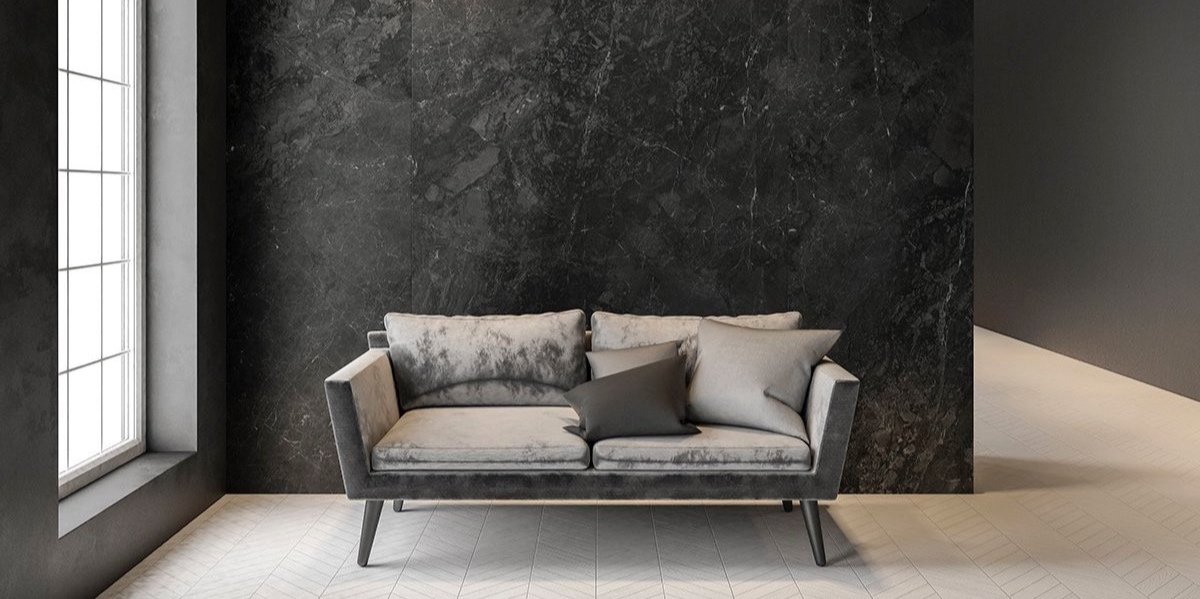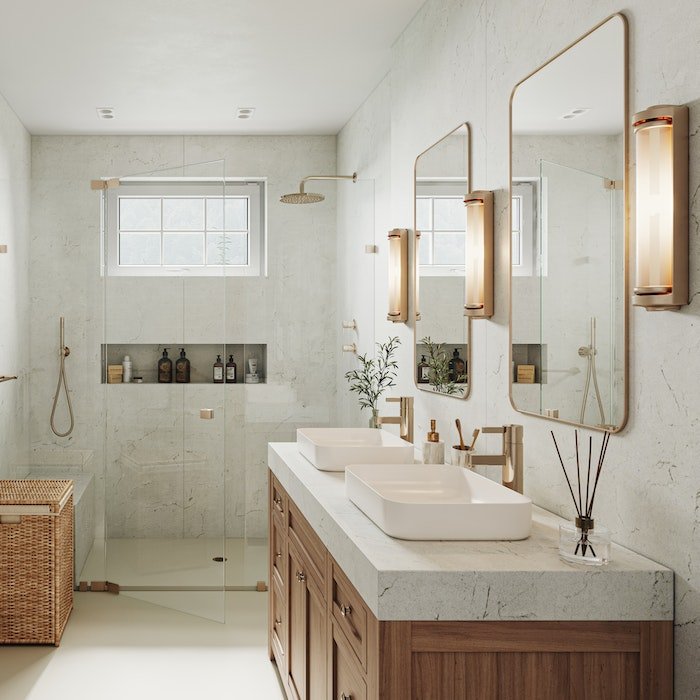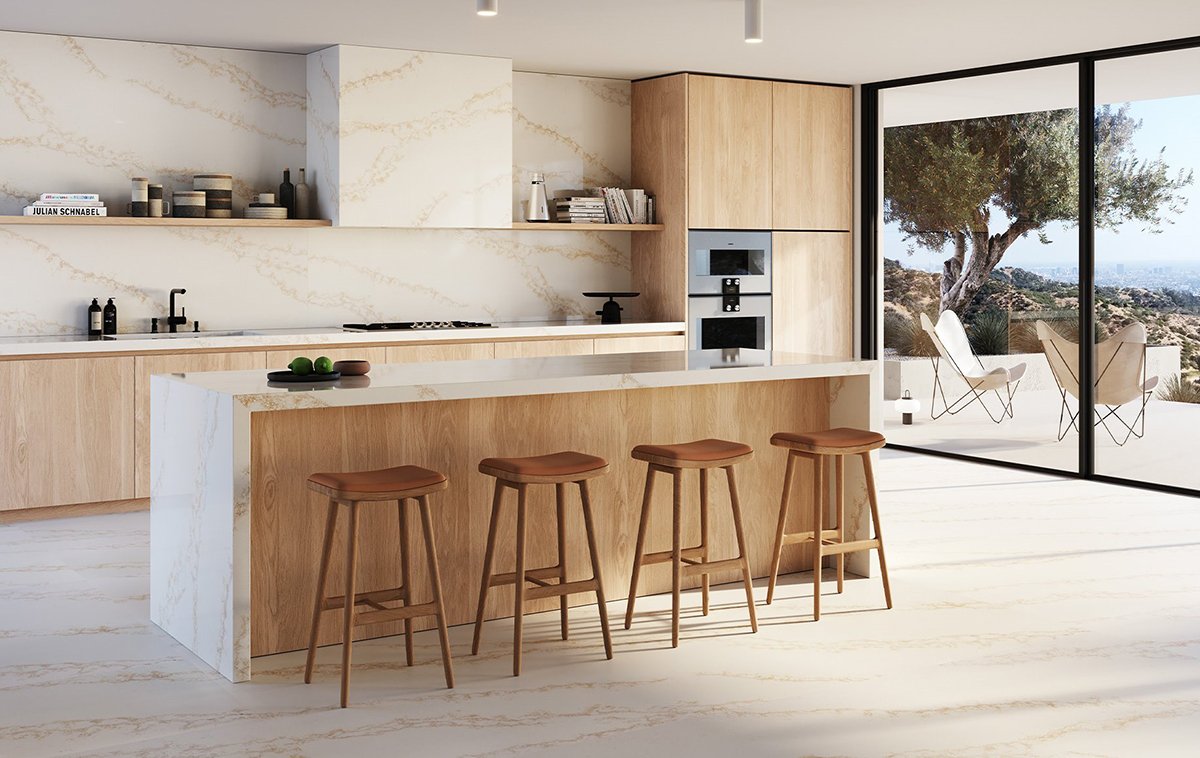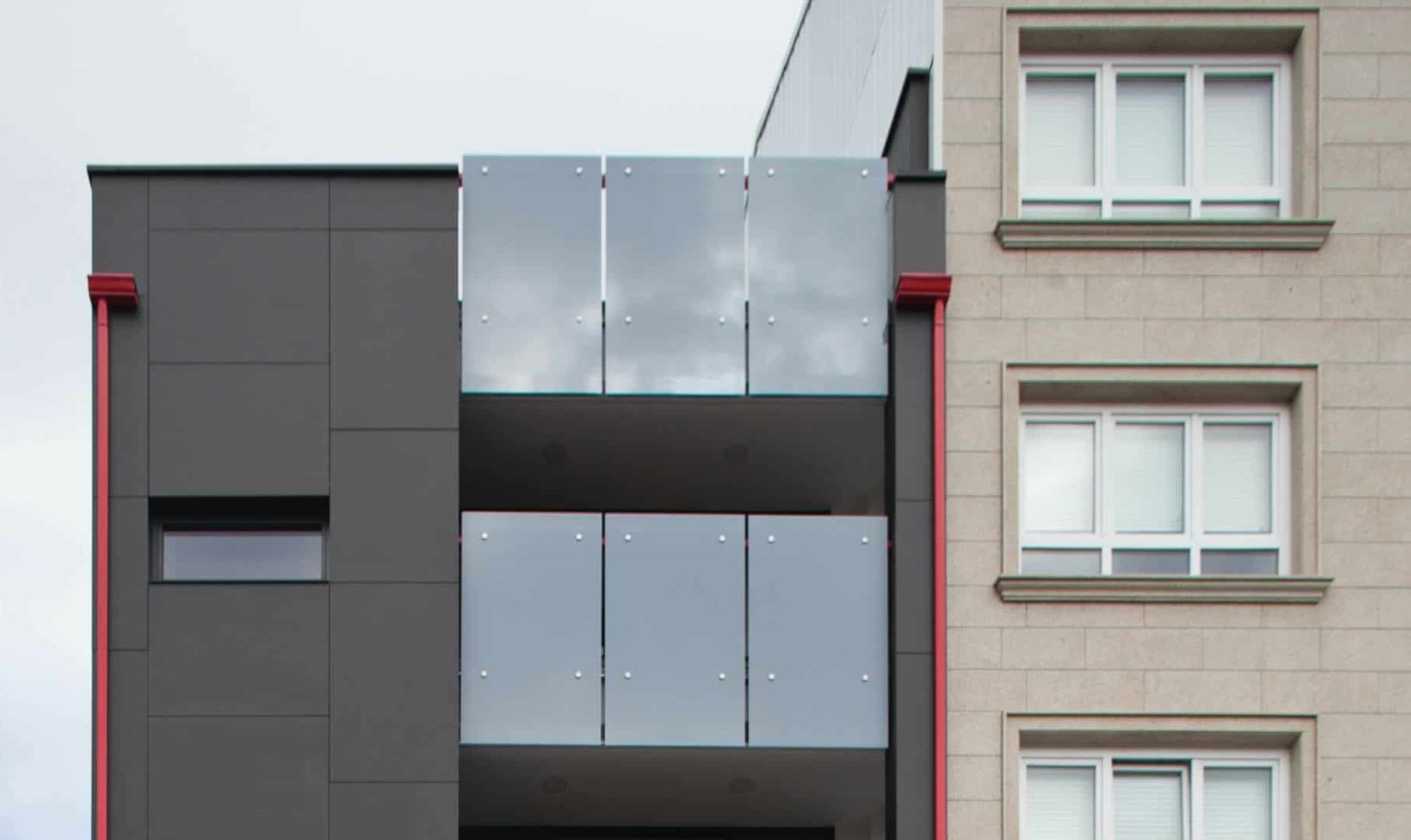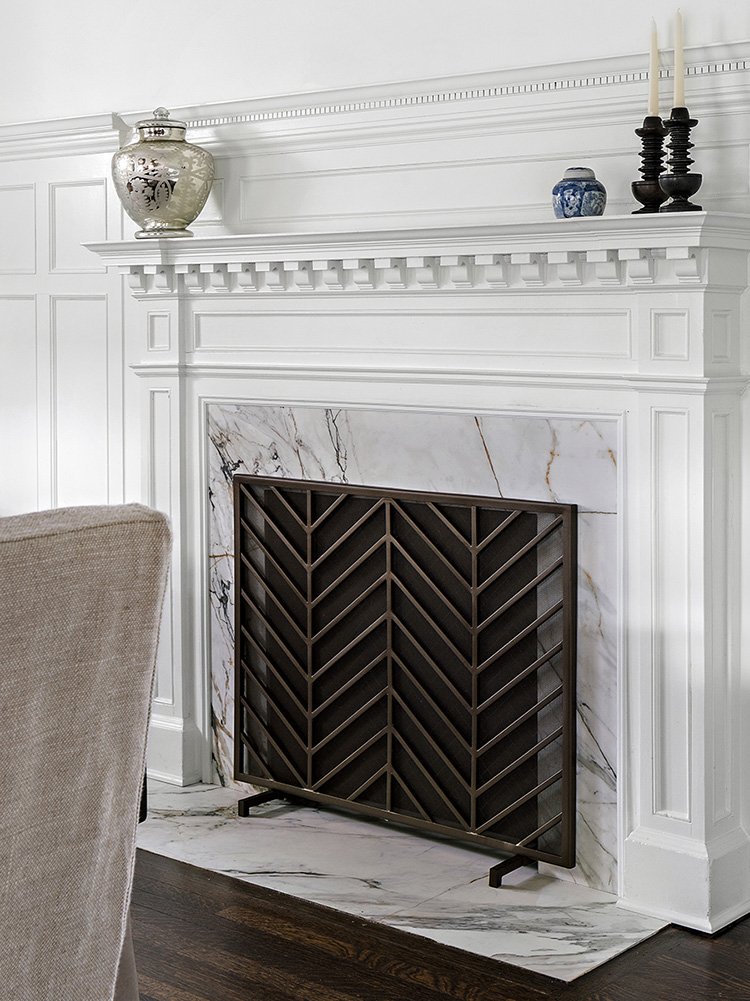About Neolith, Dekton and Lapitec: Sintered Stone for Missouri and Northern Arkansas
Find out why sintered stone, also known as ultra-compact stone, is poised to revolutionize your home inside and out with its unparalleled durability, versatility and beauty. While many companies have not yet ventured into sintered stone, WilgusIQ offers leading brands like Neolith, Dekton and Lapitec and continues to gain experience and skill fabricating and installing this amazing material in Missouri and beyond.
What you need to know about sintered stone like Neolith, Dekton and Lapitec — 16 Essential FAQs
What are the pros and cons of sintered stone like Neolith, Dekton and Lapitec?
What is sintered stone like Neolith, Dekton and Lapitec made of?
Is sintered stone like Neolith, Dekton and Lapitec the same as porcelain?
Is sintered stone like Neolith, Dekton and Lapitec the same as quartz?
Does sintered stone like Neolith, Dekton and Lapitec crack or chip?
Is sintered stone like Neolith, Dekton and Lapitec easy to clean and maintain?
Can I put a hot pan directly on Neolith, Dekton and Lapitec?
Will sintered stone like Neolith, Dekton and Lapitec fade or turn yellow?
What sizes and thicknesses do Neolith, Dekton and Lapitec come in?
How much does sintered stone like Neolith, Dekton and Lapitec cost?
Abu Dhabi Neolith kitchen.
What are the pros and cons of sintered stone like Neolith, Dekton and Lapitec?
In a nutshell: Sintered stone is hard enough to cut on, tough enough to walk on, thin and lightweight enough to use for walls, moisture-resistant enough to use for showers, and heat-resistant enough to set a hot pan on or use for a fireplace. Sintered stone comes in large formats for seamless surfaces and endless colors and textures. Most brands offer full body or through body color, allowing greater flexibility of edge options. Sintered stone is incredibly stain-resistant, fade-resistant, easy to maintain and drop-dead gorgeous. But it’s also finicky about fabrication and installation and can crack or chip more easily than natural stone, particularly on the edges.
What is sintered stone?
Sintered stone products like Neolith, Dekton and Lapitec begin as a blend of pulverized mineral dust. The blend is sintered, or fused into a solid through intense heat and compression, without the use of resins or glues.
Watch our one-minute video to learn more about how sintered stone is made.
What is sintered stone like Neolith, Dekton and Lapitec made of?
Peter Arsenault, in an article sponsored by Neolith and published on BNP Media’s website, says “Sintered stone typically requires a combination of … four specific groups of natural materials …. First are granite minerals such as quartz and feldspars, which are used to provide hardness and strength. Second are silica* and glass minerals, which add chemical stability. Third are clay minerals, which contribute adhesive properties and whiteness. Fourth, in order to create different colors or chromatic properties in the final product, natural mineral pigments.”
* Lapitec does not contain silica.
Do Neolith, Dekton and Lapitec contain silica?
Neolith contains less than 9% silica content, while Dekton products are made up of between 5 to 11% silica. In 2022, Lapitec became the first silica-free sintered stone in the world. By way of contrast, engineered quartz can contain up to 93% crystalline silica and granite up to 50%.
Are Neolith, Dekton and Lapitec all the same?
Neolith, Dekton and Lapitec use the same type of minerals and each use a sintering process to create a sintered stone product, but they are not all the same. To use an illustration, three chefs may use similar ingredients and cooking techniques when making the same dish, but each chef will use those ingredients in different measures, obtain them from different sources, add their own special ingredients and cook them differently. Such is the case with Neolith, Dekton and Lapitec. In addition, each company provides unique instructions and tool recommendations for cutting, fabricating and/or installing their product. That makes choosing a shop that has been accredited for each individual brand key to the success of your project.
Is sintered stone like Neolith, Dekton and Lapitec the same as porcelain?
Sintered stone is different from porcelain in three key areas:
Although porcelain and sintered stone share some raw materials in common, the formula for sintered stone is different from porcelain and has been designed for greater strength.
Both products are created through a sintering process, but the method and degree of compaction and heat are different.
While water absorption of porcelain is very low, no more than 0.5%, the water absorption of sintered stone is even less, no more than 0.09%, giving it the edge in stain resistance.
For more information about porcelain slabs, see our About Porcelain page.
Is sintered stone like Neolith, Dekton and Lapitec the same as quartz?
No. Although both quartz and sintered stone use natural stone as their base material, the composition, consistency, and methods for binding the minerals together are very different. Quartz depends on resins for cohesion, whereas the minerals in sintered stone are literally fused together. Unlike quartz, sintered stone contains no resins or other compounds that can scorch or discolor. For more information about quartz, see our About Quartz page.
Is sintered stone like Neolith, Dekton and Lapitec durable?
Durability in a countertop or surface is measured not only by its hardness, but also in its ability to resist stains, scratches, heat, cold, and UV rays. By this measure, sintered stone is one of the most durable surfaces on the market.
Does sintered stone like Neolith, Dekton and Lapitec crack or chip?
The sintering process that gives Neolith, Dekton and Lapitec its hardness also make it more brittle and vulnerable to chipping, especially at the edges. Manufacturer Lapitec cautions customers, “Do not hit the surface with pointed or heavy metal objects, as they could chip or, occasionally, break the material. Remember that the edges are the most sensitive part of the top.”
What can you do as a consumer to protect yourself from chipped or cracked surfaces? Three important things.
First, make sure your countertop shop has been certified by the manufacturer to fabricate and install their product. Transporting, fabricating and installing compact sintered stone presents unique challenges that can compromise the material if not handled properly. It would also be helpful to find out how many compact sintered stone jobs the shop has done and, if possible, ask those customers about their experience.
Second, pay careful attention to the quality of the walls, floors or cabinetry that will support the compact sintered stone. Most manufacturers and installers will not warranty cracking and chipping due to uneven or shifting surfaces.
Third, make an informed decision about what kind of edge you want if using compact sintered stone for countertops. The Dekton Maintenance FAQ states that “the best way to prevent the edge from chipping is to round off the edge,” and their manual recommends a minimum bevel of 3mm at the top and bottom of exposed edges.
Can you cut directly on sintered stone countertops like Neolith, Dekton and Lapitec, or will it scratch?
Neolith, Dekton and Lapitec have all released videos featuring chefs cutting and chopping directly on their products without scratches. Two words of caution, though: ceramic knives can scratch sintered stone, and metal knives may leave what’s called metal transfer that will need to be cleaned off.
Slicing bread on a Lapitec countertop.
Does sintered stone like Neolith, Dekton and Lapitec stain?
Sintered stone like Neolith, Dekton and Lapitec has no pores to absorb discoloring liquids. Spills of wine, coffee, lemon juice, food coloring, grease, even glues and ink can be easily wiped up or cleaned off.
Is sintered stone like Neolith, Dekton and Lapitec easy to clean and maintain?
Sintered stone is very easy to clean and never needs sealing. Mild soap and water is perfect for everyday cleaning, and dies and inks can be removed with a variety of simple products. One chemical, however, that should never be used on sintered stone like Neolith, Dekton and Lapitec is hydrofluoric acid.
A steaming hot pan sits on a Dekton countertop.
Can I put a hot pan directly on Neolith, Dekton and Lapitec?
You can place the hottest of hot pans directly on a sintered stone countertop of Neolith, Dekton and Lapitec or expose it to open flame without damaging it. Sintered stone contains no polymers or protective coatings that can scorch or melt. You can also take sintered stone from extremes of hot to cold without it suffering thermal shock.
Will sintered stone like Neolith, Dekton and Lapitec fade or turn yellow?
Sintered stone is UV-resistant and the colors will not fade or turn yellow. It has been used as outdoor wall cladding for thousands of buildings as well as patios and outdoor kitchens.
Bianco Olimpia Lapitec outdoor kitchen.
What sizes and thicknesses do Neolith, Dekton and Lapitec come in?
Variety in size and thickness is one of sintered stones superpowers, allowing for seamless surfaces and limitless uses. Here are some sizes.
Dekton (top to bottom) .8 cm, 1.2 cm, 2 cm and 3 cm.
Neolith offers five large-format sizes, all the way up to 10.5 x 5.33 feet. Thicknesses include .3 cm, .6 cm, 1.2 cm and 2 cm.
Dekton is available in sizes up to 320 x 144 cm (about 10.5 x 7.2 feet) and thickness of .8 cm, 1.2 cm, 2 cm and 3cm.
Lapitec slabs are about 5 square meters in size and are 1.2 cm, 2 cm and 3 cm thick.
How much does sintered stone like Neolith, Dekton and Lapitec cost?
Prices for sintered stone are on par with natural stone, but specialized tools and fabrication techniques may affect the overall cost of the project. And since sintered stone lends itself to speciality projects, each job must be individually estimated. WilgusIQ is happy to provide you with free quotes on sintered stone or any other material we carry.



